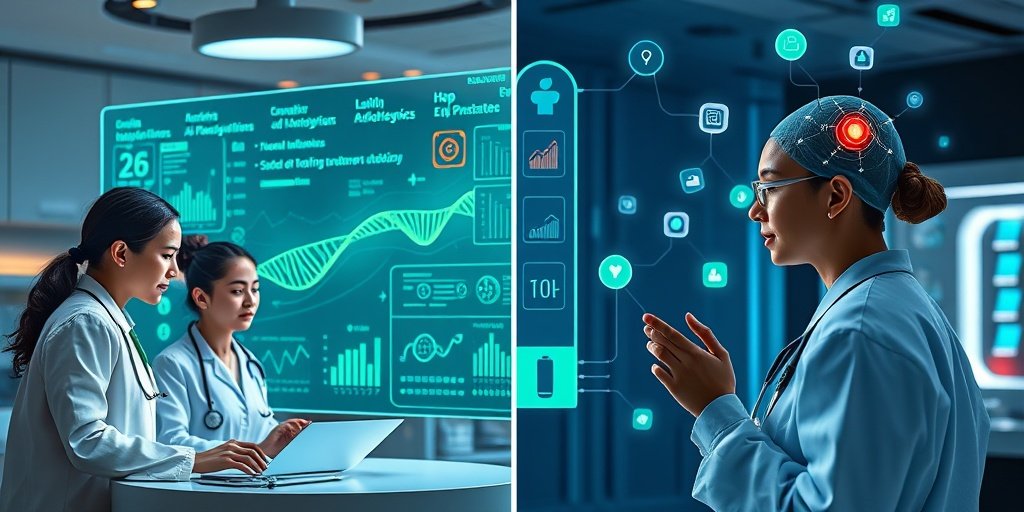⚡ Quick Summary
This article explores the transformative role of artificial intelligence (AI) in preventive and personalized healthcare, highlighting its ability to enhance diagnostic accuracy and optimize treatment strategies. With AI’s capacity to analyze complex datasets, it promises to redefine healthcare paradigms and improve patient outcomes significantly.
🔍 Key Details
- 📊 Focus: Integration of AI technologies in preventive and personalized healthcare
- ⚙️ Technologies: Advanced algorithmic architectures for predictive analysis and real-time monitoring
- 🌐 Data Types: Genomic, environmental, and lifestyle information
- 🏆 Potential Benefits: Increased diagnostic accuracy, tailored interventions, and improved patient outcomes
🔑 Key Takeaways
- 🤖 AI technologies are revolutionizing healthcare by providing data-driven insights.
- 📈 Predictive analysis can identify disease risks and tailor interventions to individual needs.
- 🌍 Multi-omics integration enhances the effectiveness of personalized medicine.
- ⌚ Real-time monitoring allows for timely interventions and improved patient management.
- 💡 Ethical considerations such as data privacy and algorithmic bias must be addressed.
- 🔬 Interdisciplinary collaboration is essential to maximize AI’s benefits in healthcare.
- 🏥 AI’s role in drug discovery could lead to faster and more effective treatments.
- 📊 Wearable technologies are becoming integral to precision therapies.

📚 Background
The integration of artificial intelligence into healthcare is not just a trend; it represents a significant shift towards more personalized and preventive medicine. Traditional healthcare approaches often rely on generalized treatment protocols, which may not be effective for every individual. AI offers a solution by leveraging vast amounts of data to provide tailored healthcare strategies that consider each patient’s unique circumstances.
🗒️ Study
The article discusses the various applications of AI in healthcare, emphasizing its role in analyzing complex datasets that include genomic, environmental, and lifestyle factors. By employing advanced algorithms, AI can predict disease risks and identify biomarkers, paving the way for personalized interventions that are more effective than conventional methods.
📈 Results
The findings indicate that AI-enabled technologies can significantly enhance diagnostic accuracy and optimize treatment strategies. The ability to analyze large datasets quickly and efficiently allows healthcare providers to make informed decisions, ultimately leading to improved patient outcomes. The integration of AI in real-time monitoring and predictive analysis is particularly noteworthy, as it demonstrates the potential for proactive healthcare management.
🌍 Impact and Implications
The implications of AI in healthcare are profound. By making personalized medicine more accessible and effective, AI has the potential to transform global healthcare paradigms. However, it is crucial to address ethical concerns, such as data privacy and algorithmic bias, to ensure that these technologies are implemented fairly and transparently. The future of healthcare could be significantly enhanced through interdisciplinary collaboration, which will help overcome existing barriers and maximize the benefits of AI.
🔮 Conclusion
This article highlights the transformative potential of AI in preventive and personalized healthcare. By harnessing the power of data-driven insights, healthcare professionals can deliver more effective and tailored interventions, leading to better patient outcomes. As we move forward, it is essential to continue exploring the integration of AI in healthcare while addressing the ethical challenges that accompany these advancements. The future of personalized medicine looks promising, and ongoing research in this field is vital for its success.
💬 Your comments
What are your thoughts on the integration of AI in healthcare? Do you see it as a game-changer for personalized medicine? 💬 Share your insights in the comments below or connect with us on social media:
The Next Frontiers in Preventive and Personalized Healthcare: Artificial Intelligent-Powered Solutions.
Abstract
Artificial intelligence (AI)-enabled technologies have the potential to significantly increase diagnostic accuracy, optimize treatment strategies, and improve patient outcomes. They are revolutionizing the field of preventive and personalized medicine by providing data-driven insights. AI is capable of analyzing large and complex datasets such as genomic, environmental, and lifestyle information much faster and more conveniently than traditional methods. Advanced algorithmic architectures in AI can predict disease risks, identify biomarkers, and tailor interventions to individual needs. The enabling role of AI in real-time monitoring, predictive analysis, and drug discovery demonstrates its transformative potential in healthcare. The role of AI in multi-omics integration, wearable technologies, and precision therapies promises to redefine global healthcare paradigms, making personalized medicine more accessible and effective. However, ethical concerns that need to be addressed to ensure fair and transparent implementation include data privacy, algorithmic bias, and regulatory gaps. This article examines the integration of AI technologies with personalized healthcare. The study also highlights the need for interdisciplinary collaboration to maximize the benefits of AI in preventive and personalized healthcare and overcome barriers.
Author: [‘Ardic N’, ‘Dinc R’]
Journal: J Prev Med Public Health
Citation: Ardic N and Dinc R. The Next Frontiers in Preventive and Personalized Healthcare: Artificial Intelligent-Powered Solutions. The Next Frontiers in Preventive and Personalized Healthcare: Artificial Intelligent-Powered Solutions. 2025; (unknown volume):(unknown pages). doi: 10.3961/jpmph.25.080